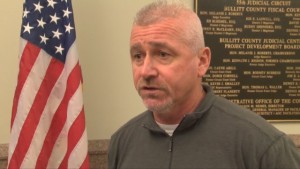William H. Meredith
The case towards the Kentucky man who shot down a drone flying over his property has been dismissed by a US District Court, citing “lack of subject matter jurisdiction.”
In July of 2015, William Meredith of KY shot down a drone belonging to David Boggs because it flew over his property. While Meredith was subsequently arrested on a prison mischief cost, native choose Rebecca Ward dismissed the fees towards him, saying that the drone did certainly symbolize “an invasion of their privacy,” and that Meredith “had the right to shoot” the drone.
Meredith was fast to capitalize on the ruling, dubbing himself “the droneslayer” and introducing droneslayer t-shirts on the market. Boggs, nonetheless, surprised over the dismissal and recognizing a doubtlessly harmful precedent, determined to attraction the case. While the drone business awaited a doubtlessly vital ruling – one that might clearly set up who in the end owns the sky – Meredith requested for the case to be dismissed, together with his legal professionals arguing that the case’s essential was exaggerated:
The Plaintiff, in response to the prison fees being dismissed towards the Defendant, is utilizing the declaratory treatment to try to create material jurisdiction – the proverbial mountain out of a molehill. A cautious studying of the Complaint reveals the argument to be as follows: The Defendent broken the Plaintiff’s drone….In actuality, it is a Bullitt County small claims court docket case.
While the query of whether or not or not a drone flying over non-public property constitutes trespass is one in every of nice significance to the drone business, the court docket didn’t agree, stating that the case didn’t meet the necessities of substantiality. “Boggs makes several arguments as to why the alleged federal question is substantial, including that a resolution of the issue will have an impact on federal aviation law, the FAA’s ability to regulate air safety and navigation, and the developing body of law regarding ht eimpact of unmanned aircrafts on privacy and property interests,” reads the Court response. “However, Boggs has not persuaded the Court that resolution of the simple issue of whether Boggs’ unmanned aircraft was flying on Merideth’s property, as opposed to federal property… is ‘significant to the federal system as a whole.’”
The case might turn into extra vital, as states reminiscent of Oklahoma contemplate payments that might maintain property house owners innocent from injury to drones flying over non-public property. The difficulty of flight over non-public property has the potential to affect not solely leisure drone operators, however business operators for a lot of purposes. While this court docket declined to take the matter up, eventually some court docket must determine.
